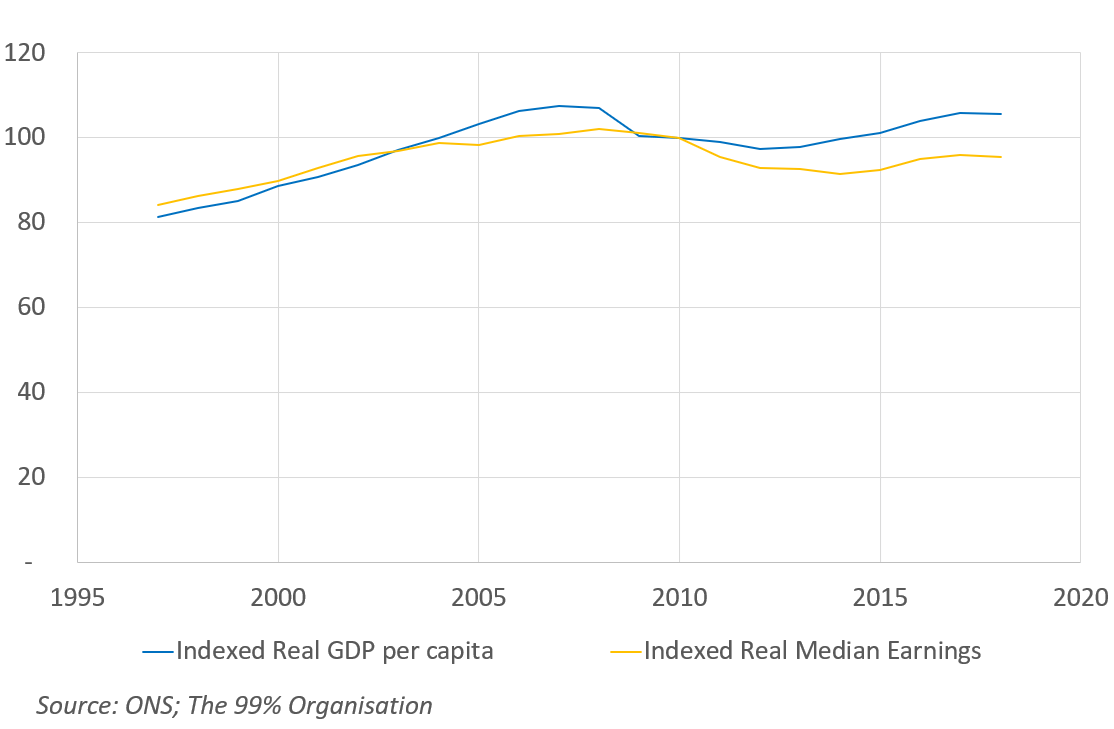For the last week, Chile has been engulfed in protests. If some of the protests themselves have been violent, the response from the authorities has been far more so. As of today (24/10/2019) the death toll stands at at least 17. Chile is in crisis. And, hard though it seems to imagine, the UK could be heading in the same direction.

What has caused Chile’s problem? The immediate trigger for the protests was a rise in the underground fares.
But the root cause is far deeper. As the French newspaper, Le Monde, reported:
Mais le contexte chilien est bien spécifique : l’ultralibéralisme qui domine la gestion de l’économie et de la société n’y a pratiquement pas été remis en cause depuis la fin de la dictature Pinochet (1973-1990). La privatisation de secteurs-clés comme la santé, l’éducation, les transports et l’eau a généré et pérennise un gouffre d’inégalités qui touche y compris les classes moyennes.
Les remboursements de santé par des assurances privées sont minimes et seule une petite minorité des Chiliens bénéficie d’hôpitaux privés de qualité. Les étudiants s’endettent sur des décennies pour financer leurs études dans des universités privées, et le système de retraite par capitalisation conjugue cotisations exorbitantes et pensions dérisoires.
50 years of market fundamentalism (of which General Pinochet is a poster-boy) produced strong (in comparison with its neighbours) economic growth, but the benefits of this growth have not reached the mass of the population. Chile has a median per capita income of only around US$2,000, lower than Brazil, Uruguay, and Venezuela.
Market fundamentalist policies have left Chile in a state where critical sectors for the well-being of the public – health, education, transport, utilities – have all been privatised and run to maximise profit. There has been an explosion of inequality which has harmed not only the working classes but also the middle classes.
Private health insurance meets the needs only of a tiny proportion of the population; most people have substandard healthcare. Students struggle with decades of debt accumulated at private universities. And the pension system charges exorbitant contributions but provides derisory pensions in return.
And the result is that what is, in itself, a relatively trivial incident – a rise in tube fares – is enough to trigger riots which have resulted in a state of emergency being declared and troops brought onto the streets.
As one Chilean woman asked, while she helped clean one of Santiago’s metro stations which had been vandalised by protesters. “You politicians, did this really have to happen so that you stop robbing money from the people?”
But surely that could never happen here?
It is unlikely to happen today, because not all the ingredients are fully in place. We still have an NHS largely free at the point of use, even though its funding has been restricted and it is struggling to perform. We still have a pension system which keeps most pensioners out of poverty, though this is beginning to change. We still have many people who own their own houses, though for the younger generation, this is becoming less common.We still have a middle-class, although most of its members are poorer today than they were 10 years ago.
Here are recent trends for economic growth in the UK (weak) and growth in the income of a typical earner (negative). In both cases, the data have been indexed so that the 2010 value is 100.

This has caused great hardship already, and if the same trends were to continue to 2050, we would be looking at a situation where the typical earner would have seen her/his income fall about 45% of the way towards today’s poverty line.

And we now have a Government which, in the words of the former Chancellor of the Exchequer, Philip Hammond, has been taken over by the extreme right wing. To the extent that the new Cabinet have been prepared to set out their vision post-Brexit, it is to turn Britain into what they call Singapore-on-Thames but might just as accurately be named Chile-on-Thames. A small-state, low tax, low regulation haven for billionaires.
And, with the deal they propose, the post-Brexit negotiations offer opportunities to lower taxes, cut public spending and rip-up regulations. Regulations that protect consumers, regulations that protect workers. Regulations that protect the environment. Regulations that protect the NHS. There can be a bonfire.
And if you find it hard to believe that a British Government would contemplate destruction of the NHS, read this UK Government Cabinet Paper.
Within a decade, with enough determination, the UK could become like Chile. And determination does not seem to be lacking. Nor readiness to side-line parliament to prevent scrutiny, and even to defy (and perhaps restructure) the courts. Nor support from large sections of the press.
We should not underestimate the danger. But we should not despair, either. As 99% explains in great detail, there are no fundamental obstacles preventing us from changing course. We merely need to choose to do so and insist that our politicians implement that choice. Five, not particularly radical, steps will put us on a path of shared prosperity. We should be planning, not to become Chile, and not for continued mass impoverishment, but for a world where everyone is at least 50% better-off than today.